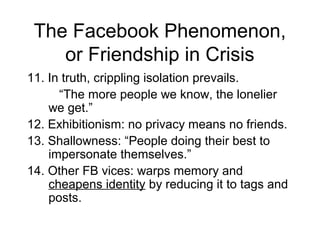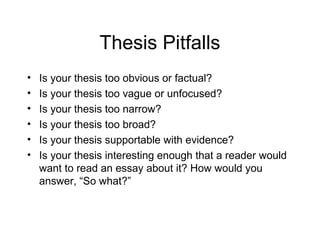106 slides set#1
- 1. BIU English 106 Introduction to Literary Forms and Critical Writing I Dr. Daniel Feldman danielb.feldman@gmail.com
- 2. Writing Blurbs 1 Recent research demonstrates how effectively and efficiently writing can improve comprehension of content in any discipline. Writing also enables students to practice analysis, synthesis, and other skills that constitute critical, creative, and even civic thinking. If writing provides one of our best means to enhance learning outcomes across the curriculum, then more writing equals more learning. Why would we design writing assignments with obstacles that discourage students from learning? --Curt Schick
- 5. Before we begin…It’s not all bad! Programming is a whole new kind of problem. Even if we spend half our time looking at those busy screens, most of us would be none the wiser. Watching The Social Network, even though you know the filmmakers want your disapproval, you can’t help feel a little swell of pride in this 2.0 generation. They’ve spent a decade being berated for not making the right sorts of paintings or novels or music or politics. Turns out the brightest 2.0 kids have been doing something else extraordinary. They’ve been making a world. --Zadie Smith, “Generation Why?”
- 6. The Facebook Phenomenon, or Friendship in Crisis 1. Friendship all and nothing: friendship characteristic relationship of our day. 2. Friendship means nothing in an age of Facebook and hundreds of friends. 3. Fr-ship was once subversive and rare. 4. Friendship suppressed by Christianity and Medievalism. 5. Friendship redux with classical revival.
- 7. The Facebook Phenomenon, or Friendship in Crisis 6. Friendship becomes quintessential modern relationship, for good and ill. 7. And with it an enervation of friendship --no longer about frank criticism, but shallow affirmation. 8. Aspect of modernity: circle of friends 9. But all false: Facebook friendships a mirage 10. Ubiquity of friendship hides a hunger for relationship in an age of solitude.
- 8. The Facebook Phenomenon, or Friendship in Crisis 11. In truth, crippling isolation prevails. “The more people we know, the lonelier we get.” 12. Exhibitionism: no privacy means no friends. 13. Shallowness: “People doing their best to impersonate themselves.” 14. Other FB vices: warps memory and cheapens identity by reducing it to tags and posts.
- 9. The Facebook Phenomenon, or Friendship in Crisis Conclusion: “Posting information is like pornography, a slick, impersonal exhibition. Exchanging stories is like making love: probing, questing, questioning, caressing. It is mutual. It is intimate. It takes patience, devotion, sensitivity, subtlety, skill—and it teaches them all, too.”
- 10. Before we write…maybe all wrong! World makers, social network makers, ask one question first: How can I do it? Zuckerberg solved that one in about three weeks. The other question, the ethical question, he came to later: Why? Why Facebook? Why this format? Why do it like that? Why not do it another way? The striking thing about the real Zuckerberg, in video and in print, is the relative banality of his ideas concerning the “Why” of Facebook.
- 11. Before we write…maybe all wrong! He uses the word “connect” as believers use the word “Jesus,” as if it were sacred in and of itself: “So the idea is really that, um, the site helps everyone connect with people and share information with the people they want to stay connected with….” Connection is the goal. The quality of that connection, the quality of the information that passes through it, the quality of the relationship that connection permits—none of this is important. That a lot of social networking software explicitly encourages people to make weak, superficial connections with each other (as Malcolm Gladwell has recently argued), and that this might not be an entirely positive thing, seem to never have occurred to him.
- 12. In-class sample essay assignment Facebook and social networking media are corrupting the institution and experience of friendship. • Do you agree or disagree? State and support your opinion in a brief, well- reasoned essay. • Use Deresiewicz’s essay or your own knowledge to support your argument.
- 13. For Next Week 29.10 & 31.10 Monday: Sample essay group editing and intros • No writing assignment for this week!!!! • Revision and editing drill Wednesday: Begin James Joyce’s Dubliners “An Encounter,” “Araby,” “Eveline,” “The Boarding House,” and “The Dead” • For next week: “Araby” and “An Encounter” http://www.literaturecollection.com/a/james-joyce/
- 14. Writing Blurbs 2 There are a thousand thoughts lying within a man that he does not know till he takes up a pen to write. -William Makepeace Thackeray, novelist (1811-1863) • Did you like this? Subscribe to A.Word.A.Day at Wordsmith.org
- 15. Vocab from last week • Quintessence / quintessential • Ubiquity / omnipresent • Apotheosis • Redux • Enervate / enervation • Relegate • Attenuate / attenuation
- 16. Today’s agenda 29.10 • Editing exercise » Correct sentence fragments, comma splices, subject-verb agreement, logical snarls, etc. » Ask me for help or use these resources: MLA Handbook, Hacker’s Writers’s Reference, Strunk’s Elements of Style, Purdue online writing lab (owl.english.purdue.edu) • Introduction to thesis sentences » Compare examples » Group editing exercise
- 17. A Smattering of Subject Sentences 1. Friendship has developed during the centuries. 2. Social networking has become an important part in our lives. 3. No doubt that the Internet, in general, and Facebook and social media, in particular, have become a big part of a lot of people’s lives. 4. Like a flame, social media is a tool that can prove useful and one which is easily corrupted. It is also a tool that can easily corrupt. 5. Facebook and social media have become a big part of our lives. 6. Many times have we heard the phrase “be careful who you trust; friend today, foe tomorrow.” But how many of us have actually taken the time to think through our friendships? 7. A world filled with social media is a new concept; even the Internet as it exists today has reached a state that not many believed possible.
- 18. A Smattering of Subject Sentences 9. In my opinion, reality is more complex and has its gray areas. It׳s not all good or bad in the rising of social networks. 10. Everything in the world can be used for the good or for the bad. Everything in the world has the potential to contribute to society in a positive or negative way. 11. Facebook and social media is like any other technology we have. We can us it in a good way or in a bad way. 12. Having Facebook, Twitter, and other social networks available almost all the time nowadays, in my opinion, reduces the amount of effort we actually put into getting to know other people. 13. We live today in a fast paced society in which the means in which we reach our goal must be as efficient and error-free as possible.
- 19. 14. I do believe that Facebook and social media are not only corrupting the experience of real friendships, but also degrading something meant to be personal and intimate to something impersonal. • In our modern society, where technology rules almost every aspect of our life and people are connecting to one another mainly through technological media, some of us are questioning whether this form of communication is sincere and creates real connections, or whether we humans are becoming more superficial because of our modern society. • We don’t churn butter anymore. We can buy it, prepackaged in a shiny foil cube, at the nearest grocery store. And yet there’s no one ranting that, because of the loss of effort applied to the manufacturing of butter, we can no longer appreciate the real joy of eating.
- 20. 17. I disagree with Deresiewicz that facebook corrupts friendship. 18. Bill d. argues, in a well written and persuasive essay, that the world as we know it has changed, and with it, so have our friendships. 19. In the 21st century, the world we live in seems to have become a scary, unfriendly place. 20. I applaud Bill Deresiewicz for having the courage to vocalize that which most people choose to ignore, in his essay “Faux friendship.” 21. Facebook didn’t ruin friendship. It was ruined already.
- 21. Constructing a Thesis Thesis = Main idea Evidence = Support for that central idea Thesis + Evidence = Argument
- 22. A Thesis is an Answer to a Question or Problem As you get closer to writing, you can begin to shape the information you have at hand into a unified, coherent whole by framing a thesis statement for your paper: a single sentence that formulates both your topic and your point of view. In a sense, the thesis statement is your answer to the central question or problem you have raised. Writing this statement will enable you to see where you are heading. (MLA Handbook)
- 23. A Thesis is an Answer to a Question or Problem A thesis is often one or more of the following: • The answer to a question you have posed • The solution for a problem you have identified • A statement that takes a position on a debatable topic Be sure to take a position with your thesis! You are entering a debate, not describing it!
- 24. Thesis Pitfalls • Is your thesis too obvious or factual? • Is your thesis too vague or unfocused? • Is your thesis too narrow? • Is your thesis too broad? • Is your thesis supportable with evidence? • Is your thesis interesting enough that a reader would want to read an essay about it? How would you answer, “So what?”
- 25. Thesis Secrets • An effective thesis states a central idea that -requires supporting evidence -is appropriate in scope for an essay -is sharply focused -can be developed in interesting directions -answers a question you or your assignment has posed -takes a stance in a debate
- 26. For Monday 5.11 Write thesis statements for five of the following: 1. Tel Aviv is a more dynamic city than Jerusalem 2. Laptop use should be prohibited in class 3. Israel would benefit by switching to a Sat/Sun weekend 4. Women benefit by postponing marriage 5. A course in English composition should be compulsory for all university students in Israel 6. Tuition should be higher for the sciences than for the Humanities 7. Students who study in single-sex schools do better 8. Electric cars should be fully subsidized
- 27. For Next Week 5.11 & 7.11 Monday: Thesis statements assignment due in class • Read “Araby” and “An Encounter” in Dubliners • Finding evidence Wednesday: Read “Eveline” and “The Boarding House” in Dubliners • Outlining and annotating exercise Dubliners available the Akademon bookstore, English library or online at: http://www.literaturecollection.com/a/james-joyce/




























